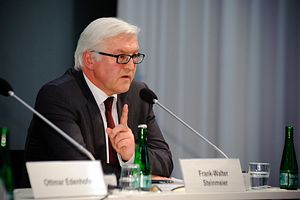German President Frank-Walter Steinmeier had some clear advice for East Asian countries when he stopped over in Tokyo on his way to the Winter Olympics this month: everyone needs to be on the same page in dealing with North Korea.
Steinmeier, a Social Democratic Party figure who previously served as Germany’s foreign minister, cited his experience as part of the drawn out negotiations on the Iran nuclear deal. “The road to an agreement with Iran was long and arduous and it is certainly not a recipe that can be directly applied to an altogether different scenario,” he said in an address to the Foreign Correspondents’ Club of Japan. “However, we did learn one important lesson: controlling nuclear proliferation and cooperating with a regime that violated international rules can only work if the international community stands united
“Without the buy-in from powers such as Russia, China, the United States and the European Union, we would have been unlikely to achieve the Iran agreement,” Steinmeier continued, “and I doubt that we can make meaningful progress towards a denuclearized Korean peninsula without such a consensus, which has to include both Korean states.”
He added: “When we look around the region we see actors that are far away from united.”
Steinmeier’s words came as North Korea used its high-profile appearance at the Winter Olympics in Pyeongchang to try to drive a wedge between allies the United States and South Korea. Kim Jong-un’s sister’s appearance at the Games, seated just meters from U.S. Vice President Mike Pence, created significant media buzz. South Korean President Moon Jae-in met with the North Korean delegation and responded politely to a hand-delivered invitation to talks north of the border – but so far there are no indications that any of the fundamentals of North Korea’s standoff with the international community have changed.
The Japanese government, for its part, has spent the past two weeks making very clear public signals that South Korea and the United States should not back off from the “maximum pressure” campaign. Shinsuke Sugiyama, the incoming Japanese ambassador to the U.S., said Prime Minister Shinzo Abe and President Donald Trump “completely share the stance of rejecting any dialogue unless its [North Korea’s] denuclearization is a precondition.”
On the sidelines of the Munich Security Conference last weekend, Foreign Minister Taro Kono said Japan was “sharing the view with the United States and South Korea that we would gain nothing if we have dialogue [with North Korea] now,” Kyodo News reported. But Japan’s lower house chairman on foreign affairs was perhaps the most explicit in his warnings. Yasuhide Nakayama used an interview with Bloomberg News last week to urge Seoul to “keep in step” with Tokyo and Washington, and to keep North Korea “under siege.”
The comments reflect growing concerns in Tokyo about Seoul’s recent signals on inter-Korean relations. Abe has been in lock-step with Trump since before the president’s inauguration – the Japanese prime minister famously was the first world leader to dash to the United States for a post-election meeting – and has repeatedly backed the position that all options should be on the table. While Moon has supported the tougher sanctions endorsed at the UN Security Council, the South Korean president has also publicly warned against allowing an outbreak of war on the Korean peninsula.
It should also be noted that Abe caused a bit of a stir in the hours before the Winter Olympics opening ceremony when he personally urged Moon to quickly resume the South’s joint military drills with the United States after the games are finished. In their bilateral meeting, Moon retorted by urging Abe to respect South Korea’s sovereignty and avoid interfering in its domestic affairs, the Yonhap News Agency reported, citing a presidential official. But this complaint may be more about a matter of protocol than the substantive issues at stake on the Korean peninsula.
Observers will be watching closely to see whether the now-regular tension resumes after the Games. Steinmeier said while both Korean teams walking into the stadium under a united flag might be a small positive sign, countries “shouldn’t fall prey to unrealistic illusions.” The German president detected the skeptical line coming from Tokyo: “I can only report that many here in Japan are of the opinion that one should not overestimate the signal sent out by North Korea when it comes to sending a joint team to the Olympics and many assume that North Korea will fall back on old, more aggressive positions afterwards.”
































